Honeyguide School Leader Support
Improving Pupil Literacy Pack
Improving Pupil Literacy Pack
Couldn't load pickup availability
Share
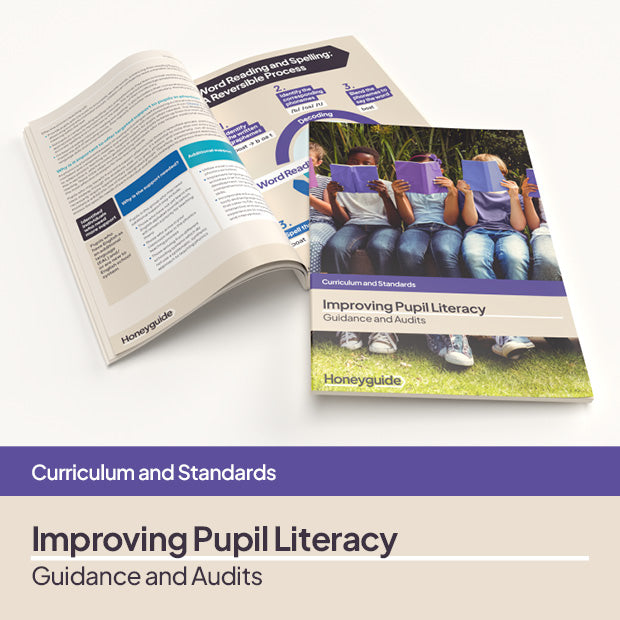
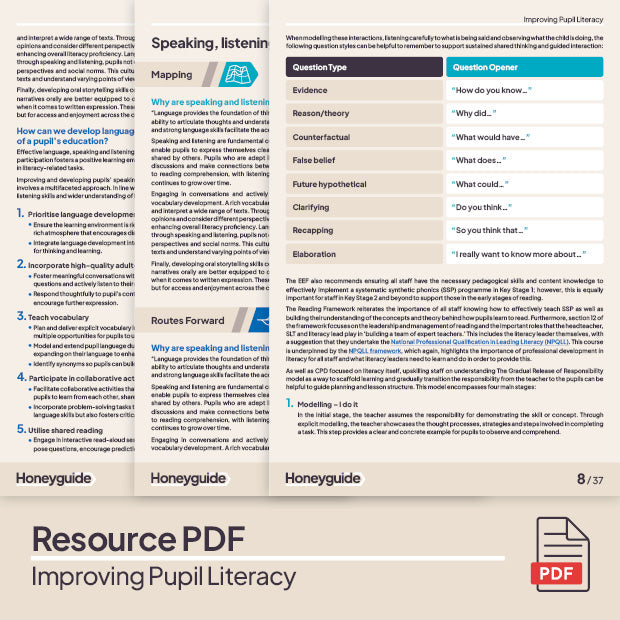
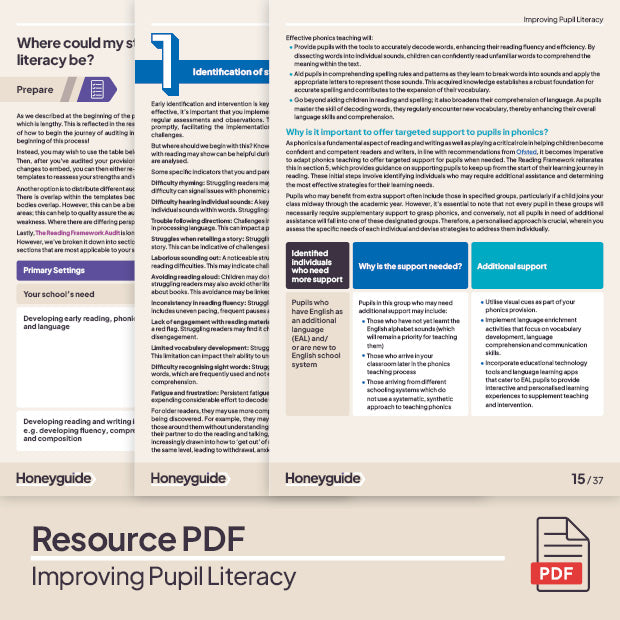
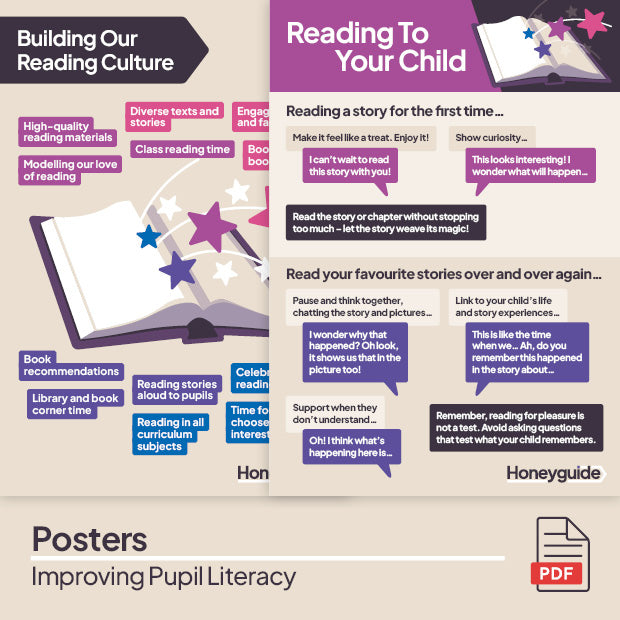
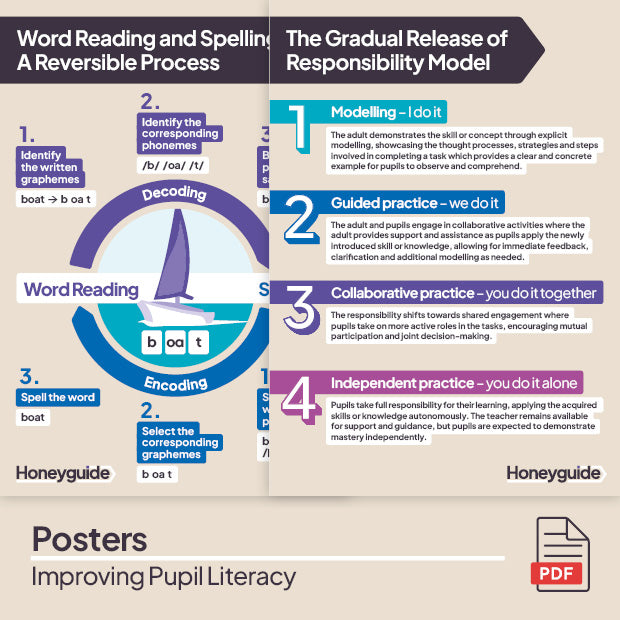
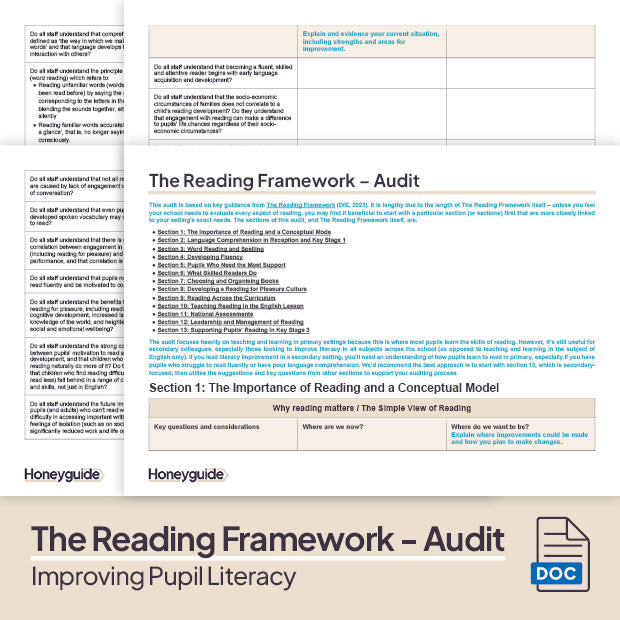
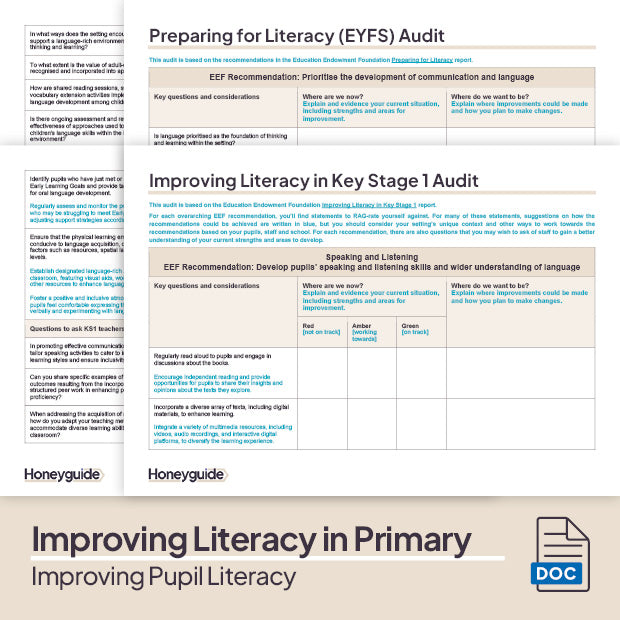
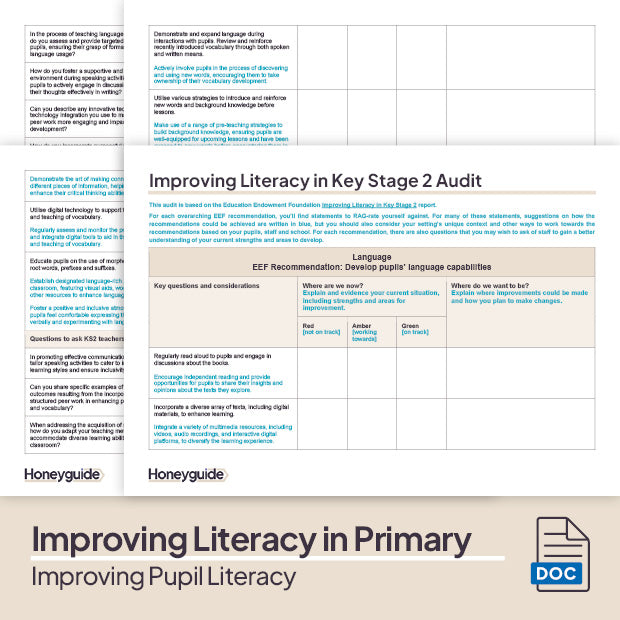
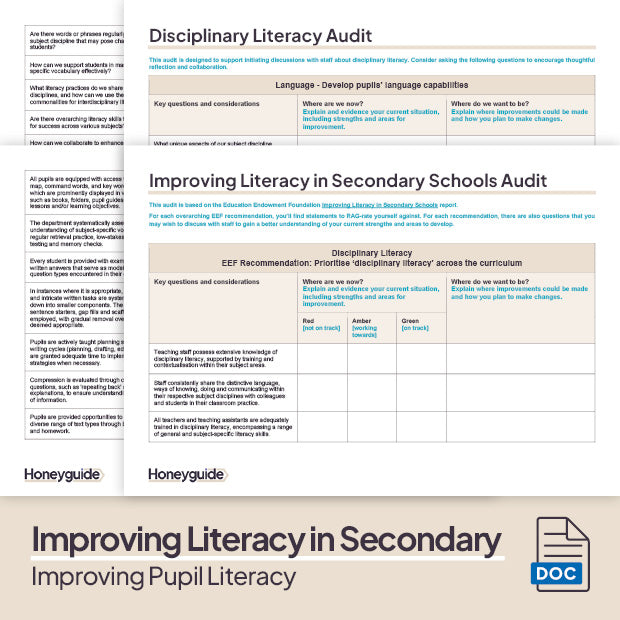
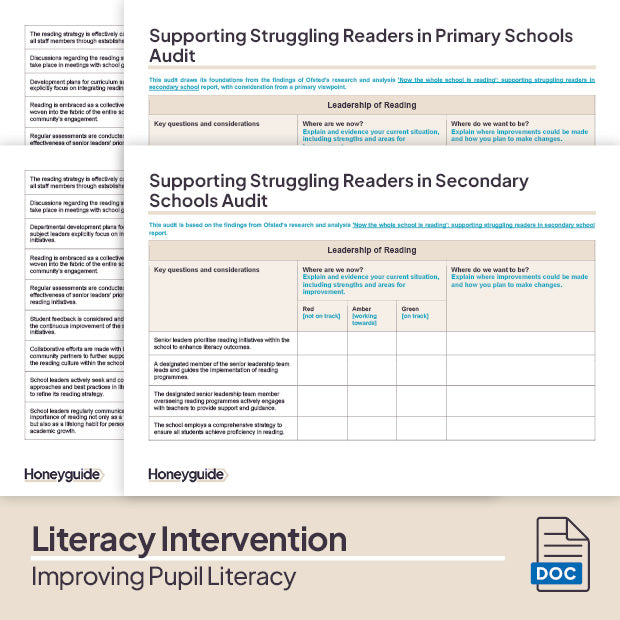
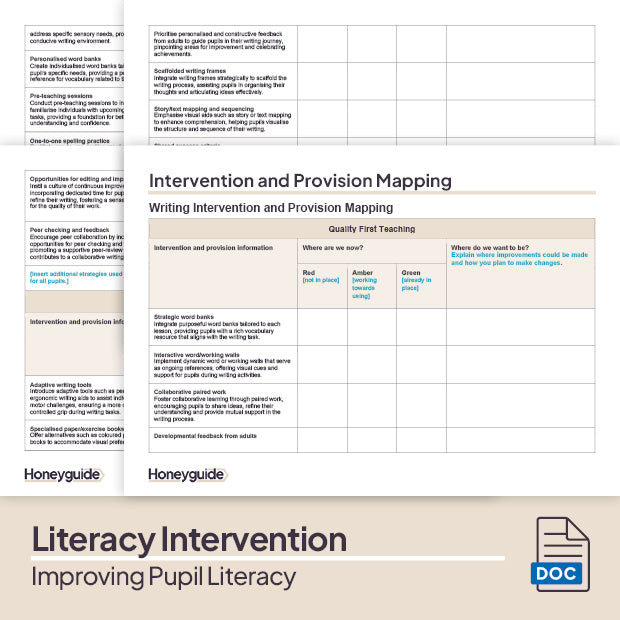
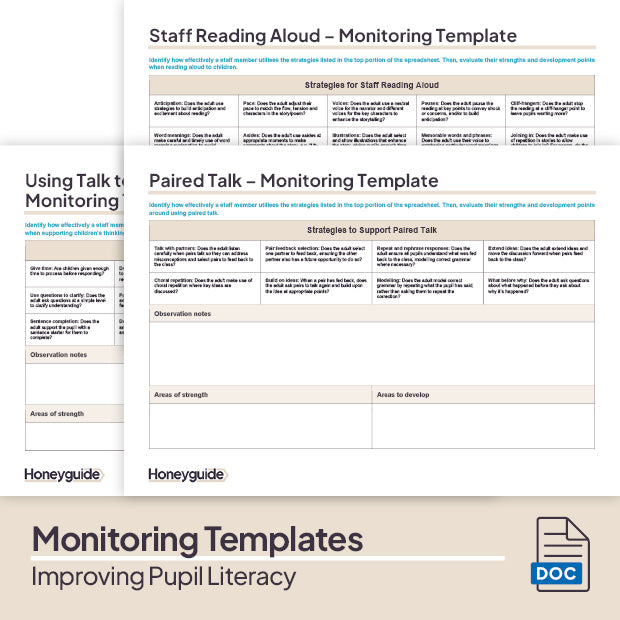
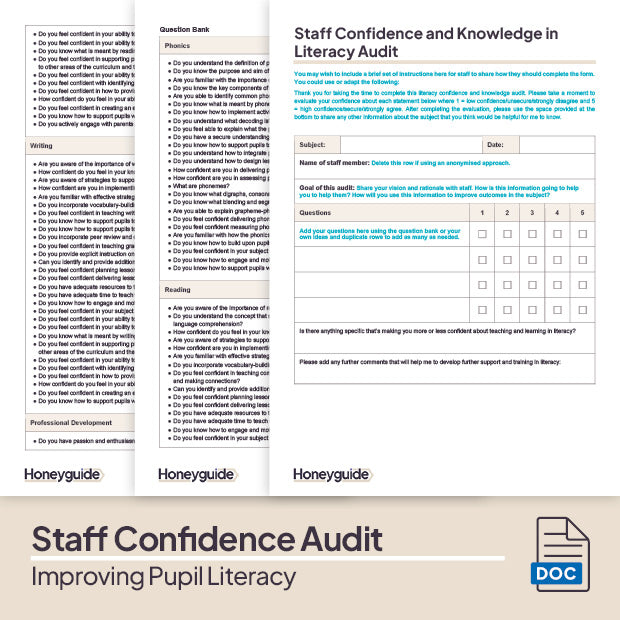
Collapsible content
What's included in this bundle?
A huge pack containing full guidance, editable temples and printable posters to support you in improving literacy in your setting.
When you make your purchase, you'll receive a ZIP file containing the whole pack, including:
- A 37-page PDF in full colour containing all the theory, research and guidance for improving literacy.
- A low-colour, print-friendly version of the same PDF.
- 13 fully editable Word document resources, including:
- Preparing for Literacy (EYFS) - Audit
- Improving Literacy in KS1 - Audit
- Improving Literacy in KS2 - Audit
- Improving Literacy in Secondary - Audit
- Disciplinary Literacy - Audit
- The Reading Framework - Audit
- Supporting Struggling Readers in Primary Schools - Audit
- Supporting Struggling Readers in Secondary Schools - Audit
- Intervention and Provision Mapping Template
- Staff Confidence and Knowledge in Literacy - Audit
- Staff Reading Aloud - Monitoring Template
- Paired Talk - Monitoring Template
- Using Talk to Support Children's Thinking - Monitoring Template
- 5 sleek display posters, including:
- The Gradual Release of Responsibility Model - Poster
- Word Reading and Spelling: A Reversible Process - Poster
- The Simple View of Reading - Poster
- Building Our Reading Culture - Poster
- Reading To Your Child - Parent Information
The audit templates are comprehensive, utilising recommendations from EEF research in literacy in the early years, KS1, KS2 and secondary settings as well as the guidance in The Reading Framework from the DfE. The huge amount of content in these audits gives you flexibility in their use, such as distributing them amongst your SLT to gather a range of views so you can compare and contrast multiple assessment of your current strengths and development points. Alternatively, you can utilise an audit at the start of your improvement process, then use one of the other audit documents later down the line, providing you with a fresh perspective on continual improvement. However you choose to use them, there's enough depth within the templates to ensure this pack can be used over a long period of time, which will help any schools experiencing steadily reducing budgets.
The posters in this pack (which also have low-colour, print friendly version) are ideal for displaying to boost the profile of reading in your school. The Gradual Release of Responsibility Model, The Simple View of Reading and the Word Reading and Spelling - A Reversible Process posters can all be displayed to prompt, remind and upskill staff about the theory and concepts that underpin teaching pupils to read. The Building Our Reading Culture poster is a great way to build and encourage a shared love of reading across your whole setting and the Reading To Your Child - Parent Information poster will help parents and families to understand the importance and joy of reading with children at home.
If you know that you need to improve literacy in your setting, this pack will help you to find a starting point and keep building upon each and every development you make, meaning your pupils can go into the next phase of their education, employment or training with the literacy skills they need to thrive.
Who will find this resource useful?
If you're an English subject leader, literacy leader, or if you hold responsibility for development of a discipline within literacy, such as reading, phonics, writing or spoken language, this pack will support you. It's also suitable for curriculum leads or anyone with responsibility for quality of education. SENDCos and anyone who leads intervention planning or catch up will also find elements of this pack useful if used as part of a team effort with those leading literacy. Lastly, headteachers, trust leaders and SLT will find this pack helpful in supporting their middle leaders to develop literacy, particular if the literacy lead is new in post.
What questions does this pack have the answers to?
We feel this quote sums up the essentiality of literacy and why it is vital we strive to improve literacy teaching and opportunities for our pupils:
“Without literacy, it’s hard to live the life you want.” National Literacy Trust
Proficient literacy skills, encompassing reading, writing and confident communication, form the cornerstone of effective learning. These skills serve as a gateway, unlocking access to all facets of the curriculum, empowering pupils to explore and pursue their unique talents and interests. However, despite concerted efforts, there remains a stark discrepancy in literacy outcomes for some children, particularly those from disadvantaged backgrounds in England who are more likely to exit primary school without securing proficiency in reading and writing than their non-disadvantaged peers.
In secondary schools, the challenge of improving literacy is fundamental. Historically, secondary school teachers have not considered themselves as literacy experts. The task of teaching children to read has typically been associated with primary schools or, at most, delegated to English department teachers. However, when educators address the literacy requirements within their subjects, they enhance their students’ likelihood of success in those subjects. Rather than questioning what they can contribute to literacy, secondary school teachers should explore the benefits literacy can bring to their teaching practices, and remember that reading, writing, speaking and listening are at the heart of knowing and doing in every subject in secondary school.
In summary, the message from the research is clear: To excel in literacy, pupils need high quality teaching and extensive opportunities to practise reading, writing and communication.
Key questions answered in the guidance:
- What guidance is available for improving literacy?
- Why is it important to improve literacy?
- What does the research say about staff expertise and professional development in literacy?
- Which areas of literacy improvement can I explore?
- Why are speaking and listening skills and language development so important?
- How can we develop language, speaking and listening skills from the beginning of a pupil’s education?
- How can we develop language, speaking and listening skills in secondary school students?
- What role does phonics play in literacy development?
- Why is it important to offer targeted support to pupils in phonics?
- How can I create an effective and positive reading culture in my school and why is it important?
- Why are both decoding skills and language comprehension necessary for reading comprehension?
- How can I support the development of both decoding and language comprehension skills?
- Why is supporting pupils who struggle to read important?
- How can we effectively support struggling readers?
- How can I support the development of pupil writing?
- Why is disciplinary literacy important?
- How does disciplinary literacy link to vocabulary development?
- How should interventions be utilised to support writing?
- Where could my start point in improving literacy be?
What else can help me?
Liking the look of the whole pack but not sure if your school needs every aspect? We've broken the contents down into four separate bundles: literacy improvement in primary, literacy improvement in secondary, reading improvement and literacy interventions.
There's no guidance in these bundles - just a few carefully selected editable templates, so for new literacy leads or those looking for a robust package, we'd say the full pack is more versatile and would better support your own CPD too. The full pack also gives schools best value for money on the whole, which is always worth considering, but the individual bundles are here for you too!













